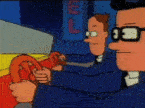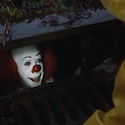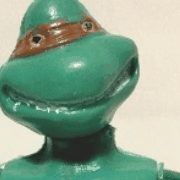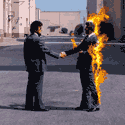|
MourningView posted:Greeble is a word DFW's mom made up when he was a kid to describe little pieces of lint that cling to stuff or things of that nature. it's been around since the 1600's in psychology... they were common objects with small changing surface details for some tests and then the term was adopted to refer to random fine surface detail in the early 70's.
|
|
|
|

|
| # ? May 8, 2024 23:54 |
|
So I just read the suffering channel. Man, aside from Good Old Neon, Oblivion pretty much sucked and I am a massive DFW fanboy.
|
|
|
|
Mr. Squishy and Another Pioneer are my favourite DFW shorts. But yes, the rest of Oblivion is strangely weird and depressing, or oppressing with its wall-of-text layouts.
|
|
|
|
I really liked Mister Squishy and The Soul is Not a Smithy. I haven't read a couple of the other stories still though. If Brief Interviews . . . is mainly about exposing, criticizing and making fun of poo poo-headed American males, Oblivion is about realizing you are one. Much bleaker and stranger.
|
|
|
|
I think the titular story also has legs. And if that's the collection with the dumb spider story, that's at least fun. Something to read in a spooky voice on Halloween.
|
|
|
|
I've going through Infinite Jest on audiobook and I'm in the mid 700s. I actually went and bought the actual book though and I feel it's worth it. I actually clapped when I finished the marijuana addict scene at the beginning of the book. The way DFW wrote that section was so choice, it made me feel exactly how an addict would feel. It almost as if the book was written as a way to keep people off drugs and alcohol. Eschaton was fun too. ulvir posted:For some reason I think my favourite parts of the book is those about the NA and AA communities. And DFW also deserve some kudos for being able to show a character talking in AAVE without it reading like a racist charicature. It's even better on audiobook. Audible's reader will actually try to get into character a little bit. I remember being lost in Santa Barbara and then the reader suddenly drops into a female african american voice ranting about po'tony. It's actually hilarious sometimes when the reader throws in little inflections or accents. skooma512 fucked around with this message at 03:45 on Sep 10, 2014 |
|
|
|
|
skooma512 posted:I've going through Infinite Jest on audiobook and I'm in the mid 700s. I actually went and bought the actual book though and I feel it's worth it. I think it's fair to say the man wrote what he knew. Tennis, grammar, depression and most likely addiction to weed. Of all the portrayals of addicts, that's the one I imagine was the most autobiographical. Also, if you want to see a (mostly) faithful adaption of the eschaton game check out the Decembrist's video for Calamity Song.
|
|
|
|
arkma posted:If you have the option, I highly recommend reading "Infinite Jest" on a Kindle. It's lighter, it makes the footnotes less of a chore and the built-in dictionary is very handy; all and all a more enjoyable experience. Amen to that; can't second this highly enough for anyone about to go on this laudable literary journey. DFW requires dictionary diving and end-note exploration like there is no tomorrow and the kindle makes it almost laughably easier, kind of like playing Goldeneye with the invisibilty cheat and infinite ammo. His work is suited more to this type of device than anything else I've read. It would have been interesting to have known what the man himself thought of e-books/e-book readers, given his penchant for meditating upon our relationship with mediums and how they affect us, etc., but I guess we'll never know...
|
|
|
|
LoRdOfThEDaNcE posted:Amen to that; can't second this highly enough for anyone about to go on this laudable literary journey. DFW requires dictionary diving and end-note exploration like there is no tomorrow and the kindle makes it almost laughably easier, kind of like playing Goldeneye with the invisibilty cheat and infinite ammo. His work is suited more to this type of device than anything else I've read. It would have been interesting to have known what the man himself thought of e-books/e-book readers, given his penchant for meditating upon our relationship with mediums and how they affect us, etc., but I guess we'll never know... Check out "Host" in The Atlantic. It was written specifically for electronic reading.
|
|
|
|
blue squares posted:Check out "Host" in The Atlantic. It was written specifically for electronic reading. And subsequently looks really dang goofy in print form, although the piece itself is still good.
|
|
|
|
Because I am a completionist weirdo, I bought a copy of The David Foster Wallace Reader. It's a nice book in the "physical object" sense, easy to read, pretty cover, good aesthetic, weighing in at about the size of Infinite Jest. It will do an excellent job introducing anyone to DFW's work. The only "new" material is a story he wrote when he was a junior in college (“The Planet Trillaphon As It Stands In Relation To The Bad Thing"), and a selection of his teaching materials (which are introduced by his mother, of all people). They're... interesting. I wouldn't buy the book for them alone. Do you need it? Probably not. I don't feel ripped off for $17 on Amazon, as it's nice to have a 1 volume "Best Of" to bring along when traveling rather than carrying two or more books along. But if you already own all his books, it's really not an essential thing at all. Nice for students or for giving as a gift ("This is my favorite author, here's some of his best work!"), though. We're definitely not the target audience of this book. Here's the table of contents, borrowed from the Howling Fantod's website (they got it from a preview copy):   
|
|
|
|
I've been listening to the audiobook of Infinite Jest, which I guess makes this my third time "reading" the book. I highly recommend it. The narrator does an excellent job even if some of the characters don't sound like you'd imagine. I find his regular narrator voice very calming. I'm on hour 26 of 64. You can download the audiobook for free if you sign-up for an Audible.com account. The endnotes, which weren't originally recorded but have been since after reader uproar, are available as a separate file. If you sign-up for Audible through Amazon you get two free downloads, which you can use for the endnotes.
|
|
|
|
Also this: https://soundcloud.com/set-in-sound/madame-psychosis-on-air
|
|
|
|
pretty rad
|
|
|
|
so rad
|
|
|
|
OP. You should read his short story collections. Brief Interviews With Hideous Men is full of experiments in style. Lot's of them fictional essays, like Borges. Other stories are snap-shots, experiments to see how much description you can add to a nanosecond without boring the reader. There a some interviews that remind me of the one man shows of Eric Bogosian, too. I loved it. Girl With The Curious Hair... All I remember is the question, "Can I burn your nipples with my lighter." Seriously, that's I can recall of that book. It's enjoyable, but had no resonating emotional or intellectual impact on me as a reader.
|
|
|
|
God Of Paradise posted:OP. You should read his short story collections. I am of a different opinion because the story you mention, the titular one, is loving tremendous. I remember (without having to google) that the pianist (who is a real guy) was Keith Jarret, that the college Republican was immune to LSD (because he was a parody of William F. Buckley Jr. which I guess some of the humor there is lost on me but still interesting) and his Porsche had two gears for reverse. "My Appearance" was amazing in the way you could see he really loved David Letterman, whereas "Little Expressionless Animals" was about how he hated Pat Sajak's very face. "John Billy" and "Lyndon" were exceptional stories that I'd recommend to anyone. "Westward the Course of Empire Takes Its Way" was interesting after reading IJ because of Wallace's weird obsession with certain tv shows.
|
|
|
|
Girl With Curious Hair has Little Expressionless Animals, which is a contender for the single best short story he ever wrote, and his own personal favorite. Oblivion is an interesting collection just because he frontloads it with the most challenging stories, and my two favorites from the collection (Oblivion and The Suffering Channel) are the last two stories, which means a lot of people probably got turned off right away and missed some really great stuff. Not that the early stories are bad at all, but man he had some balls to open with Mr. Squishy because that might be the single densest, most jargon-filled story I've ever read.
|
|
|
|
syscall girl posted:
Wallace had a strange relationship with televison. He wrote the well known essay, E Pluribus Unum, about TV. And during his times of depression he would sit and watch TV for up to eight hours straight.
|
|
|
|
blue squares posted:Wallace had a strange relationship with televison. He wrote the well known essay, E Pluribus Unum, about TV. And during his times of depression he would sit and watch TV for up to eight hours straight. I figure that just as he was the guy who bought several ounces of high delta-9 THC *blah blah drug words* weed and all the junk food to last for a week of blackout curtains up, phone off the hook binging he was also the guy with notebooks full of his observations on M*A*S*H* and possibly sending letters to the characters rather than the actors who portrayed them. He figured out the key to immortality in the post-post-modern era. Writing a really compelling series of vignettes about yourself at your absolute worst. Pretty sure he pooped himself at a toga party once or knows someone who did. *the extra apostrophe is to mention that his own private show(s) of obsession might not have been M*A*S*H but I'd give a lot to get my hands on any such notebooks
|
|
|
|
There's an anecdote in the Maxx biography about how, after he won the Genius grant, he would buy a really nice tv set and then give it away after a few days on a semi-regular basis.
|
|
|
|
So I'm approximately 100 pages into Infinite Jest, really digging it so far (other than the ~6 pages of footnotes of James Incandenza's filmography...), I just have one question. Did I miss something in the beginning explaining why the years are always referred to as "The Year of ______________________"? My guess is that it's just one of DFW's weird quirks, but I just want to make sure I'm not missing something.
|
|
|
|
The filmography is one of the best parts of the entire book, what are you talking about. Also yes, you will eventually find out why the years are named after products.
|
|
|
|
Slate Action posted:The filmography is one of the best parts of the entire book, what are you talking about. Is it really? I was winding down my reading session when I hit that part so I said gently caress it, I guess I'll go back and give it a full read-through.
|
|
|
|
It's just a lot of bad film titles which is pretty funny. e: which also has a lot of plot-hints buried within it.
|
|
|
|
top tip: dog-ear the page you'll get to with the list of years, it might help you keep better track of When you are in the book I skipped the movie list on my first reading, but the second time I read the book I plowed through it and it was awesome
|
|
|
|
The list itself isn't mind blowing but it's a good reference throughout the book when they discuss some of his films and who starred in them and give descriptions of them. Those are hilarious, and the end note helps keep them straight.
|
|
|
|
I was actually struggling with Infinite Jest up until the filmography, which gave me a plot hint that finally made some pieces fall into place and really launched me into the book. I read every footnote after that religiously and haven't regretted it.
|
|
|
|
I don't think it's possible to 'regret' reading the footnotes, theyre pretty much integral
|
|
|
|
It is possible to regret slogging thru 'Westward' tho
|
|
|
|
Rusty Staub posted:It is possible to regret slogging thru 'Westward' tho There's a really funny part in the DT Max bio where DFW thinks Westward is like this revolutionary story and the best thing he ever wrote, and then Johnathon Franzen was like 'yeah I don't really like that one at all.'
|
|
|
|
Jeep posted:There's a really funny part in the DT Max bio where DFW thinks Westward is like this revolutionary story and the best thing he ever wrote, and then Johnathon Franzen was like 'yeah I don't really like that one at all.' I liked a lot of parts in Westward but it didn't really come together for me the way he must have intended. John Billy was a much better long short.
|
|
|
|
So I just finished "E Unibus Pluram - TV and US Fiction", and it has my juices all flowing. He labors through explaining how irony is no longer a potent device in literature for rebelling against our televisual culture, as the very same culture has managed to co-opt irony and postmodern jadedness and sell it back to us. It had me tripped up because a lot of the things he, DFW, was criticizing (e.g. the ironic allusions to television and television programs that showcase the vapidity of our culture) were things he used in Infinite Jest, which I had finished before reading this essay. And the essay was published 6 years prior to IJ. I think the main difference, and this is sort of where my invitation to discussion starts, is that he utilizes irony in IJ not to just cynically berate our televisual culture, but to illustrate how it can eat away at our humanity. And I think what sets IJ apart from, and this is Wallace's critique I'm regurgitating, the hip-but-equally-vapid "image fiction" is that all the devices service a very premodern issue, which is how to remain a sincere human being in a world where it's so easy to become anything but. In other words, he's not just focusing on how lovely everything is in IJ, but how totally important it is to work towards fighting the poo poo, along with illustrating how horrible it can be when said fight is lost.
|
|
|
|
modestmusashi posted:So I just finished "E Unibus Pluram - TV and US Fiction", and it has my juices all flowing. He labors through explaining how irony is no longer a potent device in literature for rebelling against our televisual culture, as the very same culture has managed to co-opt irony and postmodern jadedness and sell it back to us. It had me tripped up because a lot of the things he, DFW, was criticizing (e.g. the ironic allusions to television and television programs that showcase the vapidity of our culture) were things he used in Infinite Jest, which I had finished before reading this essay. And the essay was published 6 years prior to IJ. I think the main difference, and this is sort of where my invitation to discussion starts, is that he utilizes irony in IJ not to just cynically berate our televisual culture, but to illustrate how it can eat away at our humanity. And I think what sets IJ apart from, and this is Wallace's critique I'm regurgitating, the hip-but-equally-vapid "image fiction" is that all the devices service a very premodern issue, which is how to remain a sincere human being in a world where it's so easy to become anything but. In other words, he's not just focusing on how lovely everything is in IJ, but how totally important it is to work towards fighting the poo poo, along with illustrating how horrible it can be when said fight is lost. I also just re-read that essay, but didn't draw such strong threads to IJ (despite how critical TV is to understanding IJ). Can you say more about the stuff above? My grasp of irony is, appropriately, defined in a mostly televisual sense, so uses of literary irony are often sort of lost on me.
|
|
|
|
Jewmanji posted:I also just re-read that essay, but didn't draw such strong threads to IJ (despite how critical TV is to understanding IJ). Can you say more about the stuff above? My grasp of irony is, appropriately, defined in a mostly televisual sense, so uses of literary irony are often sort of lost on me. Well, the way I understand it on a basic level, for both visual irony and literary, is that irony is the presentation of one thing while meaning another. So both televisual irony and literary irony are the same conceptually, but differ a lot in the ways each execute the presentation part of the equation. So as he was saying, irony as a device isn't the problem; the problem is irony's use as rebellion. It can't be rebellious anymore because the thing the ironists are trying to rebel against has figured out irony and is using it to laugh at itself while still promoting itself. TV and "the system" is now a merchant of irony. More now than ever is this apparent with ad campaigns like GEICO's wherein they basically just fart on the screen for 30 seconds making fun of the whole concept of selling car insurance, but they are actually selling car insurance. And then it gets a whole layer deeper whenever the avant-garde ironists of today (and this is where I'm out of my league, as I'm just assuming that the majority of contemporary ironists do this), using irony still as a way to rebel against the system, go so deep in their parody that they make books that posses this televisual quality in them, i.e. what Wallace calls "Image Fiction".
|
|
|
|
I think the concept of "irony" is really what most of Wallace's work is struggling with. I think he's basically correct in that irony is an excellent tool if your goal is critique, but it isn't generative (which is precisely the kind of art he wanted to create.) The fact that a lot of his writing still uses irony as a tool speaks to how fiction still hasn't been able to move past it. People have been tolling the bells for postmodernism for decades, but the truth is that irony has become so entrenched that it's basically a social default setting. I see a lot of DFW's work being an attempt to break away or at least come to terms with this. One quote of his in particular that I've always liked: quote:Anyone with the heretical gall to ask an ironist what he actually stands for ends up looking like an hysteric or a prig. And herein lies the oppressiveness of institutionalized irony, the too-successful rebel: the ability to interdict the question without attending to its subject is, when exercised, tyranny. It [uses] the very tool that exposed its enemy to insulate itself. For all his postmodern styling, DFW had some markedly modernist sentiments. The Alcoholics Anonymous portion of IJ is, for me, so powerful partly because he has the courage to say, "Hey, maybe these A.A. platitudes have some merit to them," which is basically like chumming the water for ironists.
|
|
|
|
Grizzled Patriarch posted:For all his postmodern styling, DFW had some markedly modernist sentiments. The Alcoholics Anonymous portion of IJ is, for me, so powerful partly because he has the courage to say, "Hey, maybe these A.A. platitudes have some merit to them," which is basically like chumming the water for ironists. I agree. Another representative quote, from E Unibus Pluram: Television and U.S. Fiction: quote:"The next real literary “rebels” in this country might well emerge as some weird bunch of anti-rebels, born oglers who dare somehow to back away from ironic watching, who have the childish gall actually to endorse and instantiate single-entendre principles. Who treat of plain old untrendy human troubles and emotions in U.S. life with reverence and conviction. Who eschew self-consciousness and hip fatigue. These anti-rebels would be outdated, of course, before they even started. Dead on the page. Too sincere. Clearly repressed. Backward, quaint, naive, anachronistic. Maybe that’ll be the point. Maybe that’s why they’ll be the next real rebels. Real rebels, as far as I can see, risk disapproval. The old postmodern insurgents risked the gasp and squeal: shock, disgust, outrage, censorship, accusations of socialism, anarchism, nihilism. Today’s risks are different. The new rebels might be artists willing to risk the yawn, the rolled eyes, the cool smile, the nudged ribs, the parody of gifted ironists, the “Oh how banal.” To risk accusations of sentimentality, melodrama. Of overcredulity. Of softness. Of willingness to be suckered by a world of lurkers and starers who fear gaze and ridicule above imprisonment without law. Who knows." One of the shames that The Pale King will never be finished is that I think it would have continued on this theme, examining jobs and lifestyles where the cool and hip posture just isn't viable. How do people get by when ever laughing and rebelling and making a joke of their work still leaves them with a gun in their handbag, promising to kill themselves? or dead at their desks with no one noticing? It might have been like an anti-Post Office, in some respects. What happens to the people who can't treat things like a big joke because they'll be a big shot poet some day? DFW's fictional counterpart seemed to give at least a bit more of a poo poo about other people than Bukowski's did.
|
|
|
|
Toph Bei Fong posted:I agree. Another representative quote, from E Unibus Pluram: Television and U.S. Fiction: Although he did live through the first dotcom boom, didn't he? Anything on that in his writing? (Sorry, I've just recently literally discovered the existence of the man when a lovely algorithm threw out his name after I submitted a story to it, and am not yet literate enough in his work. So far, the only thing I can really see in common is that I wrote that story while heavily depressed.)
|
|
|
|
Not to my knowledge, the man tended to stick to writing about what he knew best (tennis, literature, television) with some occaisional forays into his magazines sending him on "pith-hated anthropology" (sic) like for the state fair or the luxury cruise or porn industry (which is worth reading just for vicariously living through the sheer jaw-dropping incredulity of a rather academic and in some ways estranged man being hurled headlong into an industry that is somehow at once both superficial and base). e: however Infinite Jest has some light science-fiction elements to it and has that sort of educated but skewed view of the future that a lot of books do, so the nature of entertainment that he projects has a lot of truths to it that you can see today, even if it is viewed through a lens of twenty years before the fact (my Dad always said that science fiction, good and bad, tells you more about the society it was written in than it predicts the future). ManlyGrunting fucked around with this message at 06:39 on Jan 19, 2015 |
|
|
|

|
| # ? May 8, 2024 23:54 |
|
ManlyGrunting posted:Not to my knowledge, the man tended to stick to writing about what he knew best (tennis, literature, television) with some occaisional forays into his magazines sending him on "pith-hated anthropology" (sic) like for the state fair or the luxury cruise or porn industry (which is worth reading just for vicariously living through the sheer jaw-dropping incredulity of a rather academic and in some ways estranged man being hurled headlong into an industry that is somehow at once both superficial and base). Yeah, his short section in Infinite Jest about the effects that videocalls will have on people, as utterly absurdest as it seemed, actually turned out to be entirely prescient http://kottke.org/10/06/david-foster-wallace-on-iphone-4s-facetime
|
|
|


































